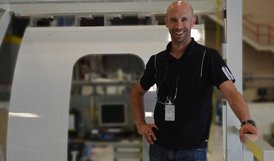CAREERS
Methods officer and mechanical engineering
Get your future into gear!
Are you interest in mechanics, but more for the practical and physical aspects of it? Do you prefer actually doing things rather than just imaging them and calculating them? You should consider becoming a mechanical engineering technologists or technician, or even a methods officer! You would work to provide technical services in design, development, maintenance and testing of various components (machines, parts, tools, etc.).
As a technologist, you understand and interpret plans (drawings and technical specifications), estimate costs, materials and schedules, and prepare progress reports. As a technician, you assist engineers and mechanical engineering technologists in a set of tasks (analysis, plans, tests, mould design, installation, repair and maintenance).
Patrick Lavallée, methods technician at Héroux-Devtek, sees a bright future for his career: “We have to adapt and integrate increasingly more advanced technologies, both for software and for machinery.”
To introduce you to the career of a methods officer, here is Philippe Pellerin, who holds this positions at L-3 MAS, describing his day-to-day: “I support the production people in understanding assembling methodologies and I draft 3D work instructions so that employs can effectively assemble the various components on the floor. Obviously, I work closely with the engineering department for the approval of different assembly drawings and detailed drawings. Each week, I participate in team meetings (purchasing, planning, program) to ensure proper tracking of progress on the various projects underway.”
Schooling

To become a mechanical engineering technologist, a college diploma with two or three years of study in mechanical engineering technology is usually required, whereas the same college diploma with one or two years of study is required for technicians. Then, provincial certification is needed, and in Quebec, membership in the regulating authority is required to use the title of professional technologist.
“After my fifth year of high school, I went to the ÉNA in Saint-Hubert, where I obtained my college diploma in aircraft construction.” –Philippe Pellerin, methods officer at L-3 MAS.